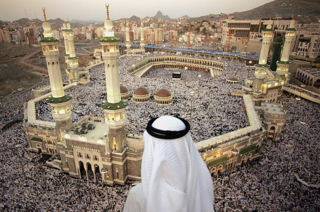Most-Viewed Posts in 2013: #5
This week on the Persecution Blog we will be re-posting the most viewed posts of 2013, starting with #5 today and counting down to last year's most viewed post on Friday.
The #5 most-viewed post was one of the "Moving Toward Muslims" posts written by Anna, who lives and works among Muslims in the Middle East. This post explained the Eid ul-Adha festival, or the Feast of Sacrifice, which was held October 15, the date of this post:
The Momentous Sacrifice
Today, the Muslim world shifts its eyes to one thing: The lamb.
Today is Eid ul-Adha, the Feast of Sacrifice.
Marking the end of the haj, the pinnacle event of this feast is sacrificing a lamb — literally slitting its throat while reciting verses from the Quran. After reserving a portion of meat to give to the poor, Muslims will clean the meat and rub it with fennel seed, turmeric and other aromatic spices. Then they will braise or roast it until the tender meat falls off the bone.

In almost every country, new clothes are a must for this special day. In the Middle Eastern country where I live, local men attend prayers early in the morning, and then receive guests as early as 6 a.m. Women with henna-decorated hands pass out chocolates and money to children who knock on their doors. But the lamb takes center stage, and some Muslims don’t even know why.
The event behind Eid ul-Adha is Prophet Ibrahim’s (Abraham) willingness to sacrifice his son. Muslims know that God stopped Abraham as he raised the knife and sent a ram from heaven so the son could go free. But the deeper significance of this story — and how it points to Jesus — most will never know.
Several years ago I had coffee with a South Asian woman near the celebration of this meaning-packed holiday.
A few simple questions led to a topic most Americans would avoid: sin. As a Muslim, Hanna explained to me how she views sin: Everyone sins, at least a little. But the payment for sin is good works.
It gave me the entrance to share about the seriousness of sin, its penalty of death and that no amount of good works are good enough for God. Ever.
The table was silent. Suspension had sufficiently been built. Hanna appeared deep in thought when she looked up from her drink and asked, “So how can anyone go to heaven?”
I was so glad she asked! “You know about Nabi Ibrahim?” I ventured, referring to the Eid ul-Adha story. “The ‘ram from heaven’ was given in place of Abraham’s son, and this sign points us to Jesus.” (As a note, some Muslims insist the son was Ishmael, not Isaac, so I used “son” in general to avoid confusion or an argument.)
After relating the story to Jesus the spotless Lamb of God who gave his life so we could go free, I asked Hanna, “Have you ever heard this before?”
“No. Never.” At the end of our coffee date, Hanna thanked me for explaining about Jesus. She said, “I have always wondered why he came.”
The Quran ends the story of Abraham and his son with this: “And We ransomed him with a momentous sacrifice” (as-Saffat 37:107, Yusuf Ali Translation). So, every year on the occasion of Eid ul-Adha, astute Muslims are left wondering, What is the “momentous sacrifice?” Surely it means more than a ram caught in the brambles.
God in his wisdom tucked this meaning-packed story in the Quran and made it the focal point of the biggest feast in Islam. Having woven this account into the fabric of Muslims’ lives, God has prepared these precious men and women to hear about His provision of the “momentous sacrifice,” Jesus, the Lamb of God.
This Eid, may they not be left wondering.
YOUR TURN: Have you ever taken part in an Eid ul-Adha celebration? Do you know any Muslims who are celebrating today?
"Anna" bloged throughout 2013 about friendship, culture, and Kingdom-living from her home in the Middle East. She loves Jesus and wants to see Him cherished by her neighbors and people everywhere. Anna is a pseudonym, and all names in her posts are changed for security reasons.
Come back to the Persecution Blog tomorrow in order to see the #4 most viewed post of 2013.